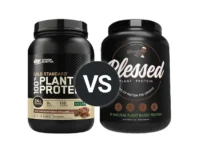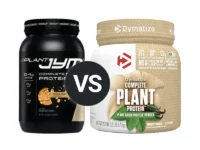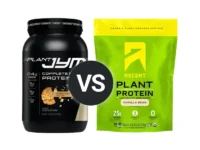Knowledge BaseYou're Questions Answered
Does pea protein powder expire?
Like all food products, pea protein powder does expire. Pea protein powder is a plant-based supplement made from yellow split peas and is commonly used by those seeking a vegetarian or vegan protein source. While it has a relatively long shelf life, its quality and nutritional value can degrade over time. Understanding the factors that affect the shelf life of pea protein powder and how to store it properly can help ensure its safety and efficacy.
Shelf Life of Pea Protein Powder
-
Typical Shelf Life
The typical shelf life of unopened pea protein powder is around 1 to 2 years from the date of manufacture. This duration can vary depending on the specific product, formulation, and any added ingredients. Most pea protein powders will have an expiration date or "best by" date printed on the packaging, indicating the period during which the product is expected to maintain its best quality1.
-
Factors Affecting Shelf Life
- Packaging: The packaging of pea protein powder plays a significant role in preserving its quality. Products stored in airtight, opaque containers are better protected from light, air, and moisture, which can degrade the product over time.
- Storage Conditions: Proper storage is crucial for maintaining the quality of pea protein powder. It should be kept in a cool, dry place, away from direct sunlight and moisture. Exposure to high temperatures and humidity can accelerate the degradation process, potentially leading to spoilage.
- Ingredients and Additives: The presence of certain ingredients, such as natural or artificial flavors, sweeteners, or preservatives, can impact the shelf life. Some additives may degrade faster than the protein itself, affecting the overall quality of the product.
Signs of Expiration
Even if the product is within its expiration date, it's important to check for signs of spoilage, which can include:
- Unpleasant Odor: A sour or rancid smell may indicate that the pea protein powder has gone bad.
- Change in Color or Texture: Clumping, discoloration, or an unusual texture can be signs of degradation.
- Off Taste: A bitter or off taste suggests that the product is no longer fresh.
Best Practices for Storage
To maximize the shelf life of pea protein powder, follow these storage tips:
- Keep the Container Sealed: Always reseal the container tightly after each use to prevent exposure to air and moisture.
- Store in a Cool, Dry Place: A pantry or cupboard away from heat sources and direct sunlight is ideal. Avoid storing protein powder in humid environments, such as near a stove or in a bathroom.
- Use a Dry Scoop: Ensure that the scoop used for measuring the powder is dry to avoid introducing moisture into the container.
- Singh, M., & Devaraj, S. (2017). Protein powders: does the source matter?. Current Sports Medicine Reports, 16(3), 157-162.
- McArdle, W. D., Katch, F. I., & Katch, V. L. (2015). Exercise Physiology: Nutrition, Energy, and Human Performance. Lippincott Williams & Wilkins.
- Gibney, M. J., Lanham-New, S. A., Cassidy, A., & Vorster, H. H. (2009). Introduction to human nutrition. John Wiley & Sons.

Your Answer
We are a participant in the Amazon Services LLC Associates Program, an affiliate advertising program designed to provide a means for us to earn fees by linking to Amazon.com and affiliated sites.



